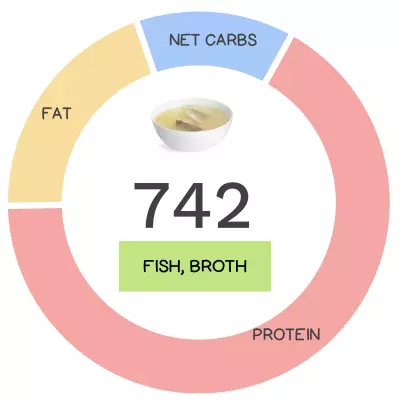
Though bone broth (prepared from beef, chicken, or pork) seems to be all the rage these days, not as much is heard about fish broth. This flavorful healing and nourishing food is equally healthy, if not more so, making it a great addition to our diets and the perfect way to warm us up on a cold day!
Bone broth is considered a type of offal (organ meat) since it is prepared from bones, which would otherwise be discarded.
Bone broth (also known as bone stock) is the flavorful, gelatin-rich liquid made from boiling bones from just about any animal you can think of (including chicken, turkey, beef, bison, pork and fish) in water for an extended period of time until the bones easily crumble in your hands. Though it may not seem like it, bone broth is considered a type of offal (organ meat) since it is prepared from bones, which would otherwise be discarded. And though it may feel like bone broth has only recently become a popular superfood, it’s actually incredibly ancient: over 2500 years ago it was being used in traditional Chinese medicine to support digestive health and to strengthen the kidneys. The famed ancient Greek physician Hippocrates also advocated the use of bone broth. Throughout the ages, civilizations across the globe have had their own unique version of this food! Sometimes it is called broth, while other times it is referred to as stock and more often than not the terms seem to be used interchangeably. To clarify, stock is essentially broth that has veggies and/or herbs added for additional flavor (and nutrients!).
Since fish bones are delicate, fish stock has the added bonus of cooking in a fraction of the time compared to mammalian bone broth (3 to 4 hours versus 24 to 48 hours on the stove top), plus fish bones are some of the cheapest available!
Fish stock, also called fumét in French, is prepared from all the parts of the fish that wouldn’t otherwise get used, like fish heads, tails, and bones (even shrimp, crab, and lobster shells can be added). The resulting liquid can be used in the preparation of countless dishes – think stew, soup (chowder), rice, mashed veggies, sauces, stir fires, hashes, or even drank by the mug-full! Since fish bones are more delicate, fish stock has the added bonus of cooking in a fraction of the time compared to mammalian bone broth (3 to 4 hours versus 24 to 48 hours on the stove top), plus fish bones are some of the cheapest available! You may even be able to get them for free if you are lucky enough to live near the coast and can get them from a local fishmonger or perhaps at your local grocery-store from the seafood counter. Though the exact nutritional profile of the stock will vary depending on the type of bones used, cooking length, and whether or not other ingredients (like vegetables and seasonings) are added, this yummy liquid will help keep our bodies healthy and our bellies happy! Requiring relatively little hands-on time investment and minimal funds, it’s definitely worth “stocking” up! (Hyuck)
Nutrivore Score for Fish Broth – 742
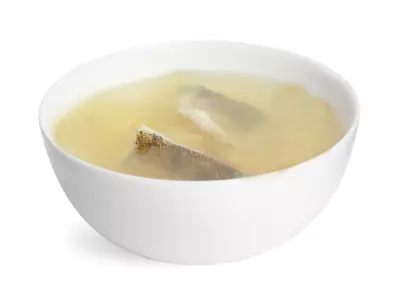
Fish broth has a Nutrivore Score of 742, making it a high nutrient-dense food! Plus, it is a low-carb and low-calorie-density food; the calorie count of fish broth is only 39 calories per cup!
Per serving, fish broth is a best source (>50% daily value) of EPA+DHA; an excellent source (20-50% daily value) of vitamin B3 (niacin); and a good source (10-20% daily value) of copper, protein, and vitamin B12 (cobalamin).
Ditch Diets. Embrace Nutrients. Start with These 5 Free Guides.
Sign up for the free weekly Nutrivore Newsletter and get 5 high-value downloads—delivered straight to your inbox—that make healthy eating simple and sustainable.

Fish Broth Nutrition Facts
One serving of fish broth is standardized to 1 cup or about 244 grams (8.6 ounces).
Fish Broth Nutrition Facts Per Serving
| Fish broth | Nutrivore Score: 742 | Nutrient Density: High |
|---|---|---|
| Serving Size: 1 cup (244 grams) | Protein: 4.9 grams | Net Carbohydrates: 1.0 grams |
| Calories: 39 | Total Fat: 1.5 grams | Dietary Fiber: 0.0 grams |


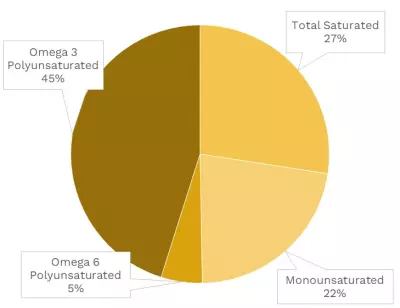
| VITAMINS | ||
|---|---|---|
| Vitamin A | 2.4 μg RAE | 0% DV |
| Vitamin B1 (Thiamin) | 0.0 μg | 0% DV |
| Vitamin B2 (Riboflavin) | 73.2 μg | 6% DV |
| Vitamin B3 (Niacin) | 3.3 mg | 21% DV |
| Vitamin B5 (Pantothenic Acid) | ~ | ~ |
| Vitamin B6 (Pyridoxine) | 24.4 μg | 1% DV |
| Vitamin B7 (Biotin) | ~ | ~ |
| Vitamin B9 (Folate) | 9.8 μg | 2% DV |
| Vitamin B12 (Cobalamin) | 0.2 μg | 10% DV |
| Vitamin C | 0.0 mg | 0% DV |
| Vitamin D (D2 + D3) | 0.0 μg | 0% DV |
| Vitamin E | 0.4 mg | 2% DV |
| Vitamin K | 0.5 μg | 0% DV |
| Choline | 22.4 mg | 4% DV |
| Myo-Inositol | ~ | ~ |
| CoQ10 | ~ | ~ |
| FUNCTIONAL FATS | ||
|---|---|---|
| MUFA | 0.3 g | 1% DV |
| ALA | 14.6 mg | 1% DV |
| EPA + DHA | 478.2 mg | 191% DV |
| CLA | ~ | ~ |
| Linoleic Acid | 0.0 g | 0% DV |
| MCT’s | 0.0 g | ~ |
| MINERALS | ||
|---|---|---|
| Calcium | 73.2 mg | 6% DV |
| Copper | 124.4 μg | 14% DV |
| Iodine | ~ | ~ |
| Iron | 0.5 mg | 3% DV |
| Magnesium | 2.4 mg | 1% DV |
| Manganese | ~ | ~ |
| Phosphorus | 73.2 mg | 6% DV |
| Potassium | 209.8 mg | 4% DV |
| Selenium | 1.7 μg | 3% DV |
| Sodium | 488.0 mg | 21% DV |
| Zinc | 0.2 mg | 2% DV |
| PHYTONUTRIENTS | ||
|---|---|---|
| Carotenoids | 0.0 μg | ~ |
| Polyphenols | 0.0 mg | ~ |
| Phytosterols | 0.0 mg | ~ |
| Glucosinolates | ~ | ~ |
| Thiosulfinates | ~ | ~ |
| Betalains | ~ | ~ |
| AMINO ACIDS & PEPTIDES | ||
|---|---|---|
| Taurine | ~ | ~ |
| Ergothioneine | ~ | ~ |
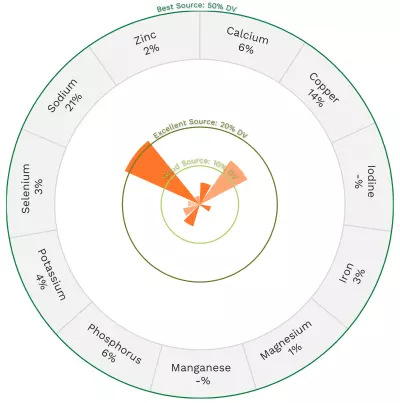
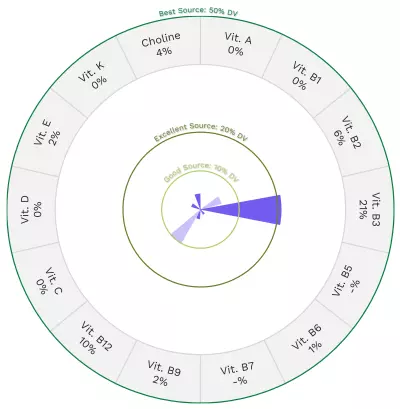
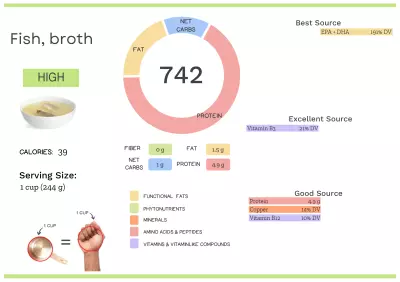
Broth Nutrition Varies With Type
Bone broth can be prepared from the bones of numerous different animals. Depending on the source of bones used, the nutrient profile will vary, as will the Nutrivore Score, but all types provide a wide range of health benefits! To maximize all the goodness broth has to offer, try incorporating different kinds in your diet.
| NUTRIVORE SCORE | |
|---|---|
| Beef stock, home-prepared | 3361 |
| Chicken stock, home-prepared | 1511 |
| Fish broth | 7421 |
| Fish stock, home-prepared | 7321 |
Impressed by all the “soup-er” nutrition in fish broth? Maybe your friends will be too!
Health Benefits of Fish Broth Nutrients
Let’s take a closer look at all of the best and excellent source of nutrients found in a 1-cup serving of fish broth and see how they benefit our health.
Fish Broth Provides 191% DV EPA+DHA
Fish broth is a best source of EPA+DHA, providing 191% of the daily value per 1-cup serving!

Eicosapentaenoic acid (EPA) and docosahexaenoic acid (DHA) are long-chain omega-3 fats that play important roles in neurological health, immune function, eye health and vision, inflammation, pain signaling, gut health, fetal development, and some aspects of cardiovascular health (like triglyceride levels and blood clotting). They exert many of their effects by helping form chemical messengers called prostaglandins, thromboxanes, and leukotrienes. EPA and DHA also serve as a structural component of the cell membrane, influencing important properties such as membrane fluidity and permeability. Small amounts of them can be synthesized from a shorter-chain omega-3 fat, alpha-linolenic acid (ALA). Learn more about EPA and DHA here.
Fish Broth Provides 21% DV Vitamin B3 (Niacin)
Fish broth is an excellent source of vitamin B3 (niacin), providing 21% of the daily value per 1-cup serving!

Niacin is a water-soluble B complex vitamin (vitamin B3) that’s needed to produce two very important coenzymes: nicotinamide adenine dinucleotide (NAD) and nicotinamide adenine dinucleotide phosphate (NADP). NAD and NADP are needed for over 400 enzymes involved in DNA repair, fatty acid synthesis, antioxidant systems, detoxification, and hormone synthesis, as well as the breakdown of fat, carbohydrate, protein, and alcohol. Niacin has therapeutic potential for cardiovascular disease and hyperlipidemia, and may also be protective against cancer and type 1 diabetes. Some research suggests it could benefit health outcomes for patients with HIV or schizophrenia as well. Learn more about niacin here.
Learn What Foods Are the Best Sources of Every Nutrient

The Top 25 Foods for Every Nutrient
The Top 25 Foods for Every Nutrient e-book is a well-organized, easy-to-use, grocery store-friendly guide to help you choose foods that fit your needs of 43 important nutrients while creating a balanced nutrient-dense diet.
Get two “Top 25” food lists for each nutrient, plus you’ll find RDA charts for everyone, informative visuals, fun facts, serving sizes and the 58 foods that are Nutrient Super Stars!
Buy now for instant digital access.
How Much Fish Broth Should We Eat Per Day?
Offal, including fish broth, is a great source of protein, which is just part of the reason it is considered one of the most nutritionally valuable foods on the planet. In fact, offal is one of the most concentrated sources of just about every nutrient out there, including important vitamins, minerals, healthy fats, amino acids, and protein.
Proteins are the molecules that perform most of the various functions of life which is why protein deficiency is detrimental to all of the body’s organs and systems, including impacting function of the brain (especially in infants and young children), immune system, gut barrier, and kidneys. Dietary protein is necessary to supply the amino acid building blocks for all of the proteins in our bodies. Physical signs of protein deficiency include edema (swelling), poor musculature, dull skin, thin and fragile hair, and failure to thrive in infants and children.
The Accepted Macronutrient Distribution Ranges (AMDR) were established by the Food and Nutrition Board of the Institute of Medicine using evidence from interventional trials with support of epidemiological evidence that suggest a role in the prevention or increased risk of chronic diseases, and based on ensuring sufficient intake of essential nutrients. The AMDR for protein is 10% to 35% calories from protein.
The recommended daily allowance of protein is 0.36 grams per pound body weight (0.8 grams per kilogram of body weight). That amounts to 56 grams for a 150-pound person. However, it’s important to emphasize that this number is considered a minimum daily allotment, and there is no established upper limit. In fact, many studies have evaluated diets containing three to four times more protein than this minimum and proven benefits to weight management, body composition, hormone regulation, and cardiovascular health. These studies suggest that an optimal protein intake for most people is probably in the range of 1.2 to 1.8 grams per kilogram bodyweight (82 to 122 grams for that same 150-pound person), and that people who are very active may see the best results at even higher intake. Learn more about protein here.
Easily track your servings of Nutrivore Foundational Foods!
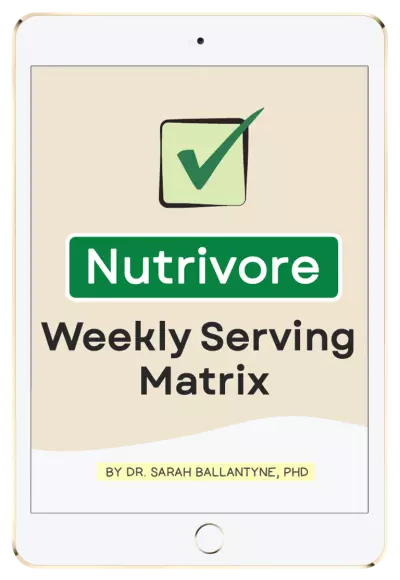
The Nutrivore Weekly Serving Matrix
The Nutrivore Weekly Serving Matrix digital resource is an easy-to-use and flexible weekly checklist designed to help you maximize nutrient-density and meet serving suggestions of Nutrivore foundational foods, all without having to weigh or measure your foods!
Includes a 22-page instructional guide and downloadable interactive guides.
Buy now for instant digital access.
cITATIONS
Expand to see all scientific references for this article.
USDA Food Central Database: Fish broth


